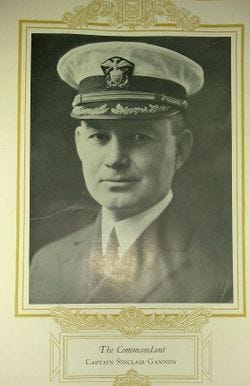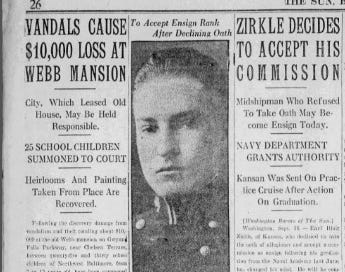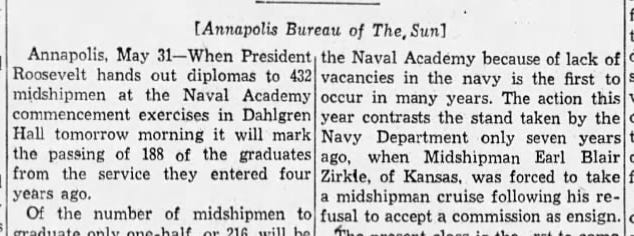I used to tell my students at the Naval Academy to be careful what they did in town, in public, while in uniform, as they were always “on camera.” Annapolis is a tourist town and there are probably millions of tourist photos of young men and women. Once while I was walking downtown I heard a passerby say “Look! There’s one now!” as they proceeded to talk photos of a midshipman about thirty yards behind me.
Cameras and news can be less benign, such as when a midshipman’s actions garner national media attention. In the years before the internet, television, and even the radio, midshipmen were still on display through newspapers. Such was the case in 1926. It was not unusual in the 1880s-1920s for a midshipman or group of midshipmen at the US Naval Academy to garner national attention, but this one was different.
It was the first time a midshipman refused a commission.
In the summer of 1926, amidst the steamy corridors of Bancroft Hall and the parade formations of Worden Field, a quiet rebellion occurred - one not born of mutiny or misconduct, but of introspection and changing stories. Earl Blair Zirkle, a first-class midshipman at the United States Naval Academy, submitted a resignation that stunned his superiors, challenged institutional assumptions, and quietly entered the annals of naval history. He was the first known midshipman to complete his education at Annapolis and yet refuse a commission.
He was born in Philippi, West Virginia but moved to Garden City, Kansas in his youth. He was appointed to the Naval Academy by Congressman Jasper Tinchers. When he arrived in Annapolis on June 16, 1922, he stood five foot five inches and weighed 122 pounds, gaining another ten over the next four years. He was a Methodist with blue eyes and brown hair who had survived more than a half dozen childhood maladies. In the Academy’s then-monthly reports on midshipmen (at the time called Cadets), he consistently received only a handful of demerits.
(Midshipman Zirkle)
Zirkle was a well-above average in both his grades, in which he consistently ranked in the top quarter, and top marks for aptitude of service as an officer. He participated in wrestling and choir and the Sub Squad. “The Lucky Bag,” the Naval Academy’s yearbook, notes that John Paul Jones’ quote “I have not yet begun to fight,” represented “Zirk’s” spirit. In the normal cryptic synopses of Lucky Bag entries, his classmates wrote, “We cannot call him a Red Mike because dancing and Baltimore have quite an attraction for him.” In Academy slang of the era, a Red Mike eschewed the ladies and dancing.
For three months in 1926, however, Zirkle changed in both his attitude and assessments of his ability to lead as an officer. In early May, he submitted his resignation. Today, midshipmen sign a form entering their Second Class (junior) year colloquially called “2 for 7s”) with the understanding that if they leave after signing, they have to repay the Navy for their education. In the 1920s, however, that penalty did not exist until the beginning of their First-Class year and no resignation was possible through the first two years of their commissioned service.
In his resignation letter of May 5, 1926, he wrote to the Secretary of the Navy (via official channels),
I have acquired a dislike for the Navy and do not desire to make it my career. It is almost impossible for me to get along with those whom I associate with when in intimate Contact. I have incurred the dislike of many of my classmates who until recently, when apprised of the fact that I would not be in their way, would not even speak to me. I believe the above and that I am unfit for military service is known to the Naval Academy Administration.
Zirkle’s First Battalion Officer wrote to Commandant Sinclair Gannon, a decorated World War I officer, that the midshipman had a 3.2 academic average and “very good conduct,” but that in an interview he demonstrated “a peculiar inferiority complex.” On May 21, the Commandant reported to the Superintendent, Rear Admiral Louis Nulton, that during his own interview with Zirkle that he could not “get much out of him…he looked down rather than at me…I feel sure that he will come to grief very soon in the service,” and that Zirkle was “a type that I would not want to receive on my ship.”
Zirkle’s resignation letter to the Secretary of the Navy of May 30 was changed, however, with the reason simply being that “it would not be in the best interests of the Navy.” This change was likely at the recommendation or direction of his Naval Academy chain of command. On June 2 Gannon wrote to Nulton, “the actions of this midshipman convince me that he is not normal, and I recommend that he not be graduated.”
When Zirkle refused to join the rest of his class for a swearing in, he was sent to the Superintendent’s office that included other senior staff. Of the meeting, the Nulton wrote “Midshipman Zirkle’s attitude throughout the above proceedings indicated insubordination and disrespect for authority and defiance without precedent in the Regiment of Midshipmen.” The Commandant ordered the Officer of the Watch to arrest Zirkle to be held in his room (Room 1150 in case any mids are reading this and live there now.) One sidenote. In his Lucky Bag entry, his classmates wrote: “The day is old for him at late blast; ask his roommates.” But during this conversation with the Superintendent, Zirkle noted he had no roommates.


(Superintendent Nulton and Commandant Gannon)
On June 5, Secretary of the Navy Curtis Wilbur announced that Zirkle would serve two years as a midshipman, rather than an Ensign like his classmates. The following day Nulton received a letter from Zirkle’s mother which read, in part, “I am so worried, we have not heard from him…at the end of the first year, he came home very homesick and expressed considerable dislike for the service. The Panic left them without money and with debts so unable to bring him home each summer.” In fact, Zirkle made it home only once during his four years at the Academy.
On June 7 Nulton wrote to Bureau of Navigation about this “peculiar and unprecedented case,” that Zirkle, about a month before graduation, began to develop characteristics which were “unusual and abnormal.” Nulton ordered an investigation of any possible persecution by his classmates but found nothing. There were no views that Zirkle was a pacifist.
While the case continued to be adjudicated, Zirkle was sent, still as a midshipman without a commission, for a summer on USS New York. At the end of the summer, USS New York’s commanding officer, Captain Clarence Abele, who had served on Admiral Schley’s flagship during the Battle of Santiago, wrote to Nulton on August 24 that:
Midshipman Zirkle is an intelligent, bright, and efficient midshipman, who is very conscientious in performing any duty assigned to him. His conduct during the present cruise has been exemplary and his performance of duty very satisfactory. He has created a favorable impression upon all officers with whom he has been thrown in contact and is considered to be good officer material.
Nulton did not concur and wrote back that the officers of New York had been misled.
Upon his return, Gannon again met with Zirkle who changed his mind and that he had made the decision that he would accept a commission if the Superintendent was willing to give it to him. Zirkle asked Gannon if there was a Secret Service Branch in the Navy. Gannon said he knew of no such organization and wrote to Nulton that this statement confirmed that Zirkle was “not mentally competent for his actions.”
In a subsequent interview with the Superintendent, Zirkle now stated that he was afraid of responsibility and would fail as an officer. He was offered a 30-day leave of absence pending his adjudication, but Zirkle declined.
Secretary of the Navy Wilbur went to the Academy to meet with Zirkle in the Superintendent’s residence. Wilbur told Zirkle he had until the hour of his departure at 0800 the following day to accept his commission otherwise he would be sent to the battleship California as a midshipman, not an Ensign. Zirkle made no response and was then detached as a midshipman to the battleship, at least according to the private reports.
Here we see in the practice of history that sources can conflict. The Superintendent writes that he was detached as a midshipman who never accepted his commission and yet newspapers reported that he had and was an ensign.
Following his brief naval service of two more years, he apparently lived in Alexandria, Virginia in the 1930s. He returned to Kansas and was an insurance agent until his retirement. In 1940 he married. But there are few references to him in newspapers until his passing in 1996.
Something changed in the weeks before he was to have commissioned. In the course of the summer of 1926, he gave about a dozen different reasons in different discussions for his change of heart. But were any of them the right one? Was there an incident or something else that caused this well-performing midshipman to suddenly and in such an unusual manner reject the service? It’s a question we’re unlikely to know. He had not children and unless there is a journal out there in some home or repository, it’s simply a reason lost and a footnote to history.
Certain midshipmen achieve mythical status, at least for some time. Philo McGiffin, Class of 1882, had exploits in demerits that were still familiar to members of the Class of 1950 but are practically unknown today in the Brigade. Some midshipmen still talk about and question the legend of Butch Ferguson from more than a decade ago (a true story.)
The same is true of Zirkle. His case was still referred to in national newspapers long after he left the navy. Such was the case in 1933 when President Franklin Roosevelt was in Dahlgren Hall handing out commissions to 432 graduates; 57 of those had resignations taking effect immediately after graduation, essentially because of lack of billets in the still small pre-war navy. Zirkle was again mentioned; he was unable to escape the decisions of 1926.








As a Midshipman in the NROTC Battalion of the University of New Mexico, one of my classmates (not a close friend) decided at the end of our second year that he could not in good conscious be an officer in the Navy, with that leadership responsibility. As he had taken advantage of the Navy paying for his tuition, books, fees, and a small stipend, he was obligated to serve as an enlisted sailor for some number of years. I didn’t understand his strong concerns, but respected his integrity in making the decision and dealing with the aftermath. He joined the fleet as a QMSA.